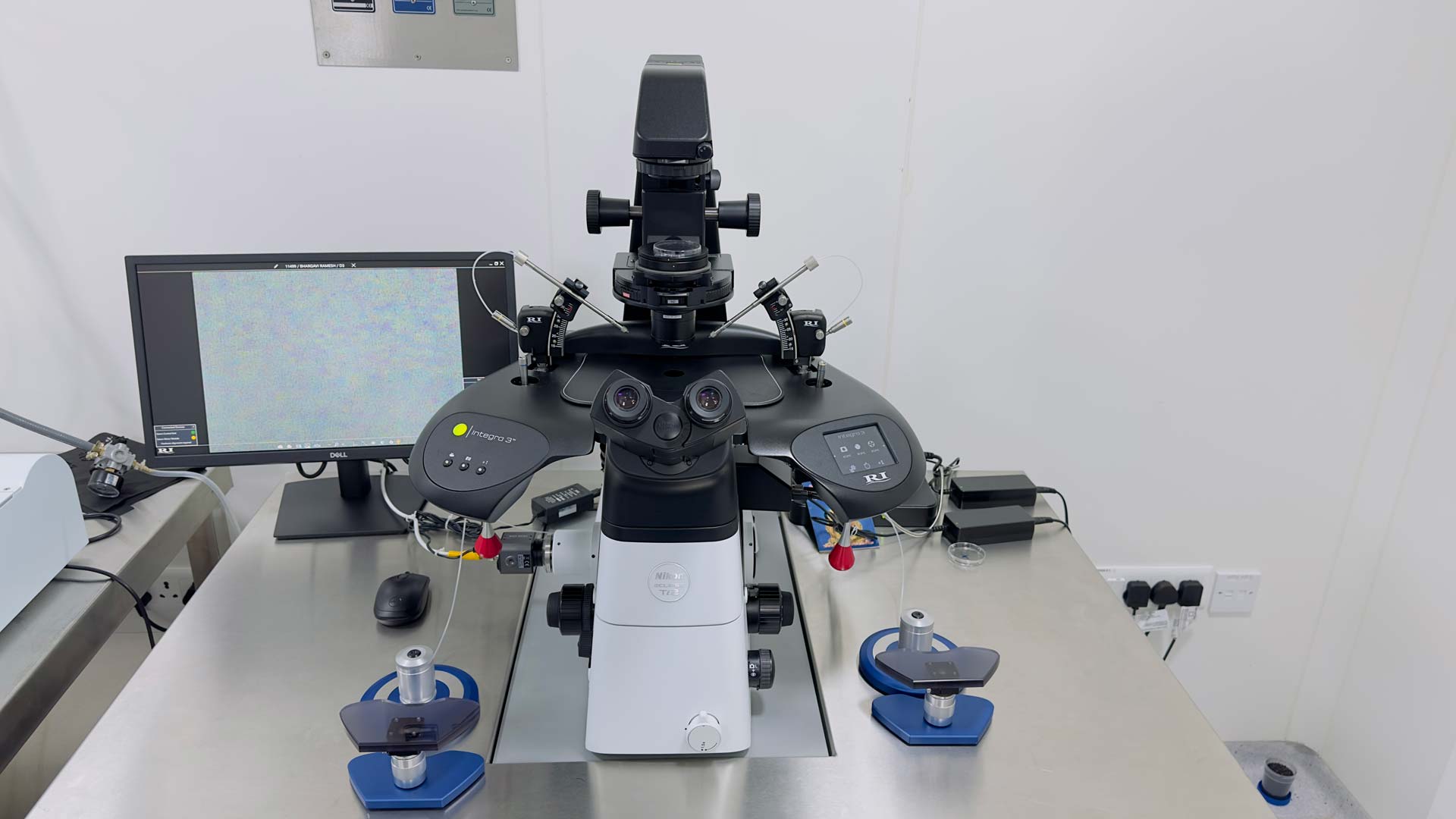What is Intracytoplasmic Sperm Injection (ICSI)?
Intracytoplasmic Sperm Injection (ICSI) is an advanced fertility treatment used as part of an IVF procedure to help fertilize eggs.
During ICSI, a single sperm is injected directly into an egg to aid in fertilization. This technique is particularly helpful for couples with severe male infertility issues.
Infertility Conditions Addressed by ICSI
ICSI is typically used to treat:
- Male infertility factors such as low sperm count or poor sperm motility
- Previous unsuccessful IVF attempt
- Sperms obtained from TESA/ TESE in pts with Blocked or absent vas deferens
- Unexplained infertility
- Advanced maternal age
- Cases where Preimplantation genetic testing is planned.
Procedure of ICSI
The ICSI process involves the following steps:
- Egg Retrieval: Eggs are collected from the ovaries using a needle guided by ultrasound
- Sperm Selection: A single healthy sperm is selected by the embryologist
- Injection: The selected sperm is injected directly into the egg
- Embryo Transfer: The fertilized egg (now an embryo) is transferred to the uterus a few days after fertilization
Tests Required Before ICSI
Before proceeding with ICSI, several important tests are conducted:
- Semen analysis: To assess the shape, movement, and count of sperm
- Ovarian reserve testing: To evaluate the quantity and quality of the eggs
Benefits of ICSI
There are numerous benefits with ICSI treatment option:
- It increased the chance of fertilization even with poor quality sperm
- There is a possibility of paternity for men with very low sperm counts or blockages
- ICSI can be used with sperm retrieved directly from the testicles or epididymis if ejaculation is not possible
- Better success rates in patients with previous fertilisation failure with IVF.
FAQ's
What is ICSI
ICSI, or Intracytoplasmic Sperm Injection, is a specialised form of assisted reproductive technology (ART) used in cases of male infertility. It comprises the injection of a single sperm directly into an egg to facilitate fertilisation. This procedure is typically performed with in vitro fertilisation (IVF) to increase the possibilities of successful fertilisation and pregnancy.
When is ICSI recommended?
Fertility experts generally recommend ICSI when there are significant male infertility factors present, including poor sperm motility, low sperm score, or abnormal sperm morphology. It is also used in cases where previous attempts at fertilisation have failed using traditional IVF methods. Your fertility specialist will determine if ICSI is the most suitable treatment modality for you based on the results of diagnostic tests and a thorough evaluation of your situation.
How is the ICSI performed?
The ICSI procedure starts with the retrieval of eggs or ova from the female through a minor surgical method known as follicular aspiration. The fertility expert then places these collected eggs in a culture dish, and a single sperm is carefully selected using a high-powered microscope and a specialised piece of equipment called a micromanipulator and immobilised. Using a specialised needle, the embryologist injects the selected sperm into the cytoplasm of the ovum. After the injection, the fertilised egg, now called an embryo, is cultured in the laboratory for a few days before being transferred into the uterus.
How is ICSI different from traditional IVF
The main difference between ICSI and traditional IVF lies in the method of fertilisation. In traditional IVF, the ova and sperm are fertilised in a culture dish, allowing the sperm to fertilise the eggs naturally. In ICSI, on the other hand, a single sperm is selected and inoculated into each egg. This targeted approach overcomes certain male infertility factors that may hinder fertilisation through traditional IVF methods.
What are the success rates of ICSI?
The success rates of ICSI vary and depend on various factors, including the age of the female partner, the quality of the ova (eggs) and sperm, and the couple's overall health. On average, the success rates of ICSI range from 40% to 50%, with higher success rates observed in younger women and couples with fewer infertility factors. Consultation with a fertility expert to understand your chances of success with ICSI is crucial.
Are there any risks or side effects associated with ICSI
Like any medical procedure, ICSI carries certain risks and potential side effects. Some potential risks include infection, bleeding, and damage to the eggs or embryos during the injection process. Additionally, there is a slightly increased chance of specific genetic abnormalities in children born through ICSI. However, the overall risks are generally low and can be minimised through careful evaluation and selection of suitable candidates for the procedure.
Can ICSI be used in cases of female infertility
The primary application of ICSI is in cases of male infertility. However, in some instances of female infertility, such as poor egg quality or previous failed fertilisation attempts with traditional IVF, ICSI may be considered as a treatment option. Your fertility specialist will assess your specific situation and recommend the most relevant treatment approach to maximise your chances of achieving pregnancy.



